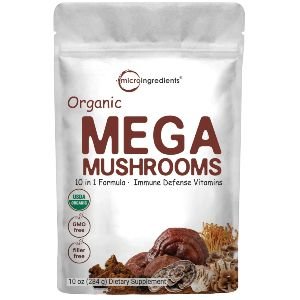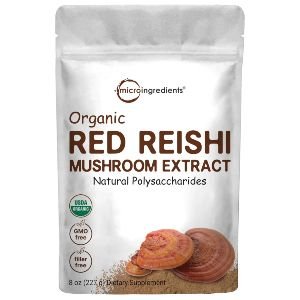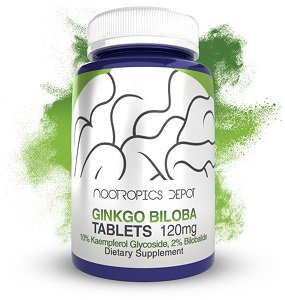12 Turkey Tail Mushroom Benefits, Nutrition, Side Effects (Fact Checked)

In this article we’ll be exploring Turkey Tail Mushroom benefits – an extraordinary and highly nutritious fungus that’s been used for centuries as a natural remedy.
From boosting the immune system to fighting cancer cells, this unassuming mushroom has a wide range of health benefits that are backed by scientific research.
But, before we dive into the specifics of turkey tail mushroom benefits let’s first take a brief look at what it is and where it comes from.
The turkey tail mushroom – also known by its scientific name Trametes versicolor – is a type of polypore mushroom that grows on trees in forests all around the world. Its name comes from its striking resemblance to the tail feathers of a wild turkey.
Aside from its unique appearance the turkey tail mushroom has a long history of use in traditional medicine.
For generations it has been prepared into teas, soups and tinctures to cure a range of diseases such as infections, inflammation, and digestive difficulties.
And with modern science now confirming many of its health benefits the popularity of this mushroom has gone through the roof.
A polypore mushroom is a type of fungus that has a woody or leathery texture, and pores on the underside of its cap instead of gills.
So, if you’re curious to learn more about the turkey tail mushroom and its benefits – keep reading!
So,in this article I am going to go through the most recent studies on its nutritional benefits, potential side effects if overconsumption occurs and the numerous ways it may benefit your health and wellness.
Turkey Tail Mushroom Health Benefits
When you sit too much every day, you disturb your body’s natural functions, slow down your metabolism, and impair blood sugar regulation. Your circulation and heart health suffer, and your muscles and bones weaken. Mentally, you face a higher risk of anxiety and depression.
To counteract these effects, incorporate standing breaks, desk exercises, or walking meetings. Short, frequent movements can make a big impact.
Small changes like these can alleviate many issues associated with prolonged sitting. Learn how simple habits can greatly enhance your overall well-being.
Prolonged Sitting Disrupts Body Functions
Sitting for long periods can mess up your body’s natural functions. It can cause problems with your metabolism, blood sugar levels, and blood flow. When you sit too much, your body’s metabolism slows down. This means you burn fewer calories, which can lead to weight gain and obesity.
Sitting also makes it harder for your muscles to use blood sugar properly. This can increase insulin resistance and raise the risk of type 2 diabetes.
Your heart health can suffer too. Blood can pool in your legs, leading to poor artery function and a higher risk of heart disease.
It can also increase your blood pressure and cholesterol levels, which are bad for your heart. Poor blood flow can cause varicose veins and, in severe cases, deep vein thrombosis (DVT).
Sitting too long affects your muscles and bones as well. Bad posture can strain your back, neck, and shoulders, causing pain and possibly leading to problems with your spinal discs. Not moving enough can also weaken your bones, raising the risk of osteoporosis.
☝️ The human body was designed to move, jump, run, and do strength activities. It is not supposed to sit all day.
Over millions of years, our bodies have evolved to be very active and capable of many physical activities, like walking, running, climbing, and lifting. Our bones, muscles, heart, and brain are all made to work best when we move and exercise.
For most of human history, people had to be active to survive. They hunted animals, gathered food, farmed, and did other hard tasks every day. Sitting still for long times is something new for humans. This change happened because of machines, technology, and how work and free time have changed.
Now, many people spend too much time sitting, whether at school, work, or home, which can be bad for our health. Regular movement and exercise are key to staying healthy and avoiding these problems.
Excessive Sitting and Mental Health Risks
Sitting too much doesn’t just hurt your body; it can also affect your mind. Spending a lot of time sitting can increase the risk of anxiety and depression. The more you sit, the higher your chances of feeling anxious or depressed.
Studies from the Semel Institute for Neuroscience and Human Behavior at the University of California Los Angeles (UCLA) show that sitting a lot can affect the brain. Through MRI scans, researchers found that the more hours people spent sitting each day, the thinner the tissue in their medial temporal lobe (MTL), which includes the hippocampus. The hippocampus is largely responsible for storing and accessing memory. This means fewer new brain cells are made, which can hurt memory over time.
Interestingly, regular exercise alone doesn’t fix the problem. Even if you exercise a lot, sitting for long periods still poses a risk. Taking short, frequent breaks can help.
Research shows that people who stand up or move around every 30 minutes have about half the risk of anxiety and depression compared to those who don’t take breaks. [1]
How To Break the Cycle: Actionable Solutions for Everyone
Whether you’re an office worker, a gamer, or a driver, breaking the cycle of prolonged sitting is vital for your health. Begin by integrating small changes such as using a standing desk.
Regular breaks to move around are also essential. Incorporating light exercises into your routine can significantly reduce the risks associated with excessive sitting.
These adjustments make a noticeable difference, promoting better overall health.
Office Workers
Office workers can break the habit of sitting all day by adding regular movement and activity into their daily routines. Start by taking short breaks every hour to stand up, stretch, or take a quick walk. Setting reminders on your computer or phone can help you remember to move.
Here are some practical tips:
- Use a standing desk: You can switch between sitting and standing, which reduces the time you spend in one position.
- Walking meetings: Instead of sitting in a conference room, walk during meetings. Walking can help you think better and stay active.
- Desk exercises: Simple exercises like leg raises, shoulder rolls, or desk push-ups can be done at your desk.
Creating a more active work environment helps your physical health and also boosts productivity and mental well-being. Employers can help by providing resources like standing desks or organizing fitness classes. Also, using fitness trackers can help you monitor your activity and meet your movement goals.
Gamers
Gamers need to move more to stay healthy, just like office workers. Sitting for a long time can cause health problems like deep vein thrombosis, high blood sugar, high cholesterol, and increased body fat.
Here are some simple ways to stay healthy:
- Take frequent breaks: Try to get up and move for 5-10 minutes every hour. You could walk to the kitchen for a drink.
- Exercise daily: Spend at least 30 minutes a day exercising. You can cycle, do calisthenics, or have a short workout to help your body.
- Use a standing desk: Switch between sitting and standing during the day to avoid being still for too long.
Make sure your workstation is set up right. Raise your monitor to eye level and use an external keyboard to help with good posture. This can stop you from hunching over.
Building healthy habits is important. Make moving a regular part of your day. Set reminders to take breaks and focus on your physical health.
Balancing small activities throughout the day is key for your long-term health and well-being.
Drivers
As a truck driver, it’s important to break the habit of sitting for long hours. Sitting for too long can cause health problems like obesity, heart disease, and muscle pain. But, there are simple steps you can take to stay healthy.
First, use your breaks wisely. Take a 10-30 minute walk or go to a nearby park to get some exercise and fresh air. Even a little bit of movement can help. Set a timer to remind you to move around every 30-60 minutes. Standing up helps your blood flow, gives you more energy, and makes you feel better.
Here are some easy tips:
- Add short activities: Even a 5-10 minute walk can help.
- Choose good distractions: During breaks, take a walk or stretch instead of looking at your phone.
- Plan your day: Make a to-do list at the end of each day to stay focused and organized.
Micro-movements: List of simple exercises that can be done at one’s desk throughout the day.
Counteract the negative effects of prolonged sitting by incorporating micro-movements into your daily routine.
Simple exercises like stretches, strength exercises, cardiovascular activities, and breathing exercises can be done right at your desk.
Explore these practical and effective options to stay active and healthy throughout the workday.
Stretches and Flexibility Exercises
Ever wondered how you can keep your body flexible and reduce stiffness right at your desk? Sitting for long periods can be hard on your body, but doing simple stretches and flexibility exercises can help.
Here are a few easy movements you can do without leaving your workspace:
- Neck Rolls: Lean your head forward, then rotate it in a circle for 10-15 seconds. Switch direction and repeat. This helps reduce tension in your neck and shoulders.
- Lower Back Stretch: Stand up and gently reach for your toes. Hold this position for 10-30 seconds. This stretch can help ease stress in your lower back and improve flexibility.
- Spinal Twist: Sit sideways in your chair and hold the backrest with both hands. Twist your body towards the back of the chair and hold for 10 seconds. Then switch sides. This exercise is good for your spine and can help reduce back pain.
These simple exercises can make a big difference in how your body feels during the day.
Strength Exercises
Adding strength exercises to your daily routine can be easy and helpful, even while seated at your desk. These small movements can help you fight the bad effects of sitting too long, like weak muscles and poor blood flow.
Here are some simple exercises you can do without leaving your workspace:
- Seated Core Bracing: Sit up straight, tilt your hips a bit forward, and pull your belly button in. Hold for 10-15 seconds, relax, and repeat 5 times.
- Marching Core: Sit on the edge of your chair, tighten your stomach muscles, and lean back a little while keeping your back straight. For an extra challenge, lift one foot at a time. Hold for 10-15 seconds, relax, and repeat 5 times.
- Shoulder Blade Pinches: Sit up straight and pinch your shoulder blades together like you’re squeezing a pencil between them. Relax and repeat 20 times.
These exercises help keep your muscles strong and improve your posture and overall health. By adding these simple moves to your day, you can fight the harmful effects of sitting too much. Remember, small actions can lead to big changes.
Cardiovascular Exercises
Improving your heart health while at your desk is possible with simple movements. These exercises can fit into your daily routine and help reduce the bad effects of sitting too long.
Here are three easy exercises you can try:
- Jogging in place: Stand up and jog in one spot for 1-2 minutes. This quick exercise raises your heart rate and can be done without disturbing your workspace.
- Desk push-ups: Place your hands on the edge of your desk and do push-ups while keeping your body straight. Aim for 10-15 repetitions to work your upper body and boost your heart rate.
- Chair dips: Sit on the edge of your chair, grip the seat, extend your legs, and lower your body towards the floor. Push back up and repeat 5-10 times. This targets your triceps and improves blood flow.
Adding these simple exercises to your workday can improve your health. They’re quick, effective, and need no special equipment. This makes it easy to stay active throughout the day.
Breathing Exercises
To reduce stress and improve focus while at your desk, try simple breathing exercises like the 4-7-8 technique. This exercise involves breathing in for 4 counts, holding the breath for 7 counts, and then exhaling for 8 counts. It helps calm your mind and boost concentration without leaving your chair.
Breathing exercises can help manage the bad effects of sitting for a long time. When you sit for too long, your body’s processes slow down. You may also have less blood flow and more muscle tension. Breathing exercises can help by making you relax and getting more oxygen into your body.
Another easy technique is diaphragmatic breathing. Sit up straight, put one hand on your chest and the other on your belly. Breathe deeply through your nose. Make sure your belly rises more than your chest. This helps your diaphragm work better, reduces muscle tension, and improves posture.
These small movements are easy to add to your daily routine. They can make a big difference in how you feel during the day. Take a few moments each hour to practice these exercises and notice the improvement in your overall well-being.
Making Movement a Habit: practical strategies to integrate movement into your day
Creating new habits takes time, but with some planning, you can add more movement to your daily routine. Start with small, easy goals and build up slowly. Here’s a simple schedule to get you started:
| Time | Activity |
|---|---|
| 9:00 AM | Start work, sitting |
| 10:30 AM | Stand up and stretch for 5 minutes |
| 12:00 PM | Lunch break – eat standing or take a walk |
| 2:00 PM | Switch to standing desk or desk exercises |
| 3:30 PM | Take a quick walking break |
| 5:00 PM | End of workday |
Technology can help remind you to move. Smartwatches and fitness trackers often alert you when you’ve been sitting too long. There are also apps that send reminders to take movement breaks.
Small changes can make a big difference. Stand while talking on the phone, take the stairs instead of the elevator, or walk to a colleague’s desk instead of emailing. Add these steps gradually, and moving more will become a natural part of your day. This approach not only breaks up sitting time but also improves your overall well-being.
Recent studies on the dangers of sitting or the benefits of movement
Adding movement to your daily routine is important. Recent studies show that sitting too much can be harmful, and being active has many benefits.
A study from the University of California, San Diego found that sitting for more than 11 hours a day raises the risk of death by 57%, compared to sitting less than 9.5 hours. Even regular exercise can’t fully remove these risks.
Another study in the British Journal of Sports Medicine says that just 22 minutes of exercise each day can help reduce the bad health effects of sitting too much. Each extra 10 minutes of activity per day lowers the risk of death by 15-35%.
The Mayo Clinic’s research shows that sitting for long periods is linked to metabolic syndrome. This includes obesity, high blood pressure, high blood sugar, and bad cholesterol levels. These problems increase the chances of heart disease, stroke, and type 2 diabetes.
A study in JAMA Open Network found that people who sit most of the day at work have a 16% higher risk of death from all causes and a 34% higher risk of heart disease. Adding just 15-30 minutes of daily physical activity can help reduce these risks.
Conclusion
Make movement a priority in your daily routine to counteract the effects of prolonged sitting. Integrate micro-movements like desk exercises, take regular breaks to stand, stretch, or walk, and consider using standing desks. These small changes can enhance your metabolism, boost circulation, and improve mental well-being.
Take action today: start incorporating these tips into your routine for better health and quality of life.









